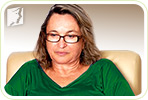Besides various physical symptoms, like hot flashes or weight gain, women passing through the menopausal transition are often tormented with psychological ailments, one of them being depression. Luckily, depression is one of the most curable mental health conditions, and there are numerous ways to go about doing so.
Continue reading to learn everything you need to know about depression treatments so that you can regain control over your emotional health and restore long-lasting well-being.
Three Approaches to Treating Depression
There are three levels of treatment for depression from which women can choose: (1) Lifestyle Changes, (2) Alternative Medicine, and (3) Medications and Therapy. The goal is to begin with the most natural treatments, like lifestyle adjustments and herbal supplements alongside psychotherapy, and only move on to pharmacological treatments if necessary.
Lifestyle Changes for Depression

Making slight changes in one's lifestyle is the first level of depression treatment. It involves the lowest risks but, conversely, the most self-discipline.
Nutritious Diet
Depression is known to decrease appetite or cause overeating, thus compromising women's nutrition. As such, it is imperative to be mindful about maintaining a regular meal schedule with foods rich in healthy fats, complex carbs, and lean protein as well as the following micronutrients:
- Phytoestrogens are plant compounds that exert weak estrogenic effects on the body, helping relieve symptoms of depression and other menopause ailments.
Soy, alfalfa, oats, tomatoes, flax
- Omega-3 fatty acids have shown effective in the treatment of depression and other mental health illnesses.1
Fish, walnuts, chia, flax, sacha inchi
- Tryptophan is the precursor of serotonin, the “happy hormone,” and its consumption has been found to lower depression symptoms.2
Eggs, sesame, salmon, spinach, nuts
- Probiotics, good bacteria that occupy the gut,have been linked to a significant reduction in depression.3
Cheese, kefir, yogurt, kombucha, sauerkraut
Additionally, studies have shown that the Mediterranean diet - rich in fruits, vegetables, whole grains, fish, and low-fat dairy - helps decrease the risk of depression.4,5
Regular Exercise
Staying physically active is one of the best ways to give oneself a quick mood boost. For some women, it can even be as effective as antidepressants thanks to the serotonin, dopamine, and endorphins whose release it triggers.6 It may also help lower stress, which is a known risk factor for depression.
Amount: The recommendation for healthy adults is to do 150 minutes of low- to moderate-level exercises per week, or 75 minutes of high-intensity activity.7
Type: It is best to combine aerobic exercises, like dancing or jogging, with muscle-strengthening workouts, like those involving resistance bands. Walking outdoors can also be beneficial for treating depression.
Useful tips: While depressed, exercise might be the very last thing on a woman's mind. If so, it is best to start slow, even a few minutes daily, and gradually build up.
Precautions: Because the risk of osteoporosis is higher among middle-aged women due to hormonal imbalance, they are advised to stay away from strenuous or injury-prone sports.8
Wholesome Habits
To complement a healthy diet and exercise, women can consider various healthy habits that promote hormonal balance, relax the mind, and promote a better outlook on life while they undergo adequate depression treatment.
Reducing stress can lift the mind, calm down thoughts, promote relaxation, and reduce levels of cortisol, the stress hormone.9 Meditation, yoga, or deep breathing exercises are good options.
Considering alternative therapies, like acupuncture or biofeedback, have shown effective for lowering the severity and duration of depression.10,11 A study has shown that foot reflexology can also relieve menopause depression.12
Spending time outdoors every day allows women to obtain adequate amounts of vitamin D, whose lack is known to contribute to the development depression, especially during winter months.13
Quitting addictions to smoking or excessive alcohol drinking is a key component of effective depression treatment. Studies have shown that both smokers and alcohol drinkers are more prone to depression.14,15
Creating a support network and doing volunteer work can give women a sense of belonging, reassurance that they are not alone, and a boost of “happy hormones,”all of which can be beneficial for healing from depression.16
Alternative Medicine for Depression

Alternative medicine, which comprises the second treatment level, offers a number of options to treat menopausal depression by tackling its underlying cause, hormonal imbalance, at its source.
There are two types of herbal supplements that can be beneficial in depression treatments: phytoestrogenic and hormone-balancing supplements.
Phytoestrogenic Supplements
Phytoestrogenic supplements, like St. John's wort or red clover, work by introducing phytoestrogens - or plant-based estrogenic compounds - into the body, which mimic the body's own estrogen. This promotes hormonal balance to relieve depression and other menopausal ailments. However, their long-term use may cause the body to become less able to produce its own hormones, resulting in further imbalance.
Hormone-Regulating Supplements
Hormone-regulating supplements, like Macafem, do not contain any outside hormones. Rather, they function by providing the hormonal glands with nutrients to stimulate their own hormone production. This balances not only estrogen levels, but also those of progesterone and testosterone, thus alleviating symptoms of an imbalance. Since hormone-balancing supplements carry virtually no side effects, they are safe for long-term use.
From Nature and Health Magazine, Dr. Chacon says:
"Macafem's nutrients help restore natural hormones in women. Unlike hormone drugs, which are basically resumed in taking synthetic hormones, Macafem acts totally different in your body. It nourishes and stimulates your own natural hormone production by inducing the optimal functioning of the pituitary and endocrine glands." Click on the following link to learn more about Macafem.
A combination lifestyle changes and herbal supplements alongside psychotherapy is usually the most effective and holistic approach to treating depression. In some cases, however, it is necessary to add medications for optimal results.
Conventional Medicine for Depression

There are two types of conventional approaches to treating depression: through psychotherapy, which has proven highly beneficial, and medications, which are also effective, but carry the highest risks and costs.
Psychotherapy
Psychotherapy is often the first recommended clinical treatment of depression. It generally requires a significant time commitment to see results. Most common types of therapy for depression are as follows:
Cognitive behavioral therapy (CBT) is the most common type of therapy for depression,consisting of changing destructive or negative thought patterns and behaviors for more constructive ones.
Interpersonal therapy (IPT) is another effective form of psychotherapy to treat depression and prevent its relapse. It focuses on resolving conflicts in relationships that might be contributing to symptoms.
Medications
Most medications are designed to treat depression by altering the brain's chemistry, including neurotransmitters that affect mood and emotions. They also may help increase concentration, regulate appetite, and improve sleep patterns.
Antidepressants, such as selective serotonin reuptake inhibitors (SSRIs), are generally the first line of pharmacological treatments for depression.
Other medications that might also be prescribed for treating depression include mood stabilizers or antipsychotics, either alone or along with antidepressants.
Hormone replacement therapy (HRT),which contains estrogen, progesterone, or their combination, used to be the go-to treatment for depression and other menopause ailments. While HRT can relieve depression symptoms, its use has been linked to serious side effects and increased health risks, as the following studies have shown.
Other Treatment Options
In the case of severe depression symptoms and an increased risk of suicide, other treatment options include electroconvulsive therapy (ECT) or transcranial magnetic stimulation (TMS).
These three levels of depression treatment are not mutually exclusive. While women's needs change during the menopausal transition, they may naturally move between various approaches to ease their symptoms. More and more are finding that a combination of herbal supplements, lifestyle changes, and counseling is the most effective way to fight menopausal depression.
A Safe Way of Treating Depression
Implementing Lifestyle Changes:
- Eating foods rich in phytoestrogens, probiotics, and tryptophans
- Keeping up with regular physical activity, preferably outdoors
- Reducing stress through mediation, yoga, and acupuncture
- Creating a support network and engaging in volunteer activities
And Taking Herbal Supplements:
- Phytoestrogenic herbal supplements, like St. John's wort
- Or natural hormone-regulating supplements, like Macafem
Sources
- National Alliance on Mental Illness. (2017). Depression. Retrieved March 12, 2020 fromhttps://www.nami.org/learn-more/mental-health-conditions/depression
- Nutrients. (2016). Influence of Tryptophan and Serotonin on Mood and Cognition with a Possible Role of the Gut-Brain Axis. Retrieved March 12, 2020 from https://www.ncbi.nlm.nih.gov/pmc/articles/PMC4728667/
- The American Journal of Psychiatry. (2016). Interpersonal Psychotherapy for Mental Health Problems: A Comprehensive Meta-Analysis. Retrieved March 12, 2020 fromhttps://ajp.psychiatryonline.org/doi/full/10.1176/appi.ajp.2015.15091141?journalCode=ajp
Footnotes:
- Elsevier. (2015). Omega-3 fatty acids and the treatment of depression: a review of scientific evidence. Retrieved March 12, 2020 from https://www.ncbi.nlm.nih.gov/pmc/articles/PMC5481805/
- Archives in Psychiatric Nursing. (2014). The Effects of Dietary Tryptophan on Affective Disorders. Retrieved March 12, 2020 from https://www.ncbi.nlm.nih.gov/pmc/articles/PMC4393508/
- Nutrients. (2016). Effect of Probiotics on Depression: A Systematic Review and Meta-Analysis of Randomized Controlled Trials. Retrieved March 12, 2020 from https://www.ncbi.nlm.nih.gov/pmc/articles/PMC4997396/
- Annals of Neurology. (2013). Mediterranean Diet, Stroke, Cognitive Impairment, and Depression: A Meta-Analysis. Retrieved March 12, 2020 from https://onlinelibrary.wiley.com/doi/epdf/10.1002/ana.23944?referrer_access_token=rBozvo39WlkG8jQ64HeQ9U4keas67K9QMdWULTWMo8Nu8BkK3irBHnIpDqfEBKIWiEs1n3sBynPhjArRYC06w4-55uyO_wtLiQSn7VvrftiVk23M4G5H5LisDX9EyH4WuNE5jA73m3PD8spSL0j7nw%3D%3D
- Psychiatry research. (2017). Dietary patterns and depression risk: a meta-analysis. Retrieved March 12, 2020 from https://www.ncbi.nlm.nih.gov/pubmed/28431261
- Harvard Health Publishing. (2018). Exercise is an all-natural treatment to fight depression. Retrieved March 12, 2020 from https://www.health.harvard.edu/mind-and-mood/exercise-is-an-all-natural-treatment-to-fight-depression
- American Heart Association. (2018). Recommendations for Physical Activity in Adults. Retrieved March 7, 2020 from https://www.heart.org/en/healthy-living/fitness/fitness-basics/aha-recs-for-physical-activity-in-adults
- Chronic Diseases and Translational Medicine. (2015). Primary osteoporosis in postmenopausal women. Retrieved March 7, 2020 from https://www.ncbi.nlm.nih.gov/pmc/articles/PMC5643776/
- International Journal of mental Health Nursing. (2019). The effects of mindfulness-based stress reduction on depression, anxiety, and stress in older adults: A systematic review and meta-analysis. Retrieved March 7, 2020 from https://www.ncbi.nlm.nih.gov/pubmed/30656813
- Journal of Alternative and Complementary Medicine. (2013). Effects of Electroacupuncture on Depression and the Production of Glial Cell Line-Derived Neurotrophic Factor Compared with Fluoxetine: A Randomized Controlled Pilot Study. Retrieved March 7, 2020 from https://www.ncbi.nlm.nih.gov/pmc/articles/PMC3768227/
- Nursing Research and Practice. (2015). Biofeedback Intervention for Stress, Anxiety, and Depression among Graduate Students in Public Health Nursing. Retrieved March 7, 2020 from https://www.ncbi.nlm.nih.gov/pmc/articles/PMC4411437/
- Complementary Therapies in Medicine. (2019). The effects of foot reflexology on depression during menopause: A randomized controlled clinical trial. Retrieved October 12, 2020 from https://www.sciencedirect.com/science/article/abs/pii/S096522991930281X
- Issues in Mental Health Nursing. (2011). Vitamin D and Depression: Where is all the Sunshine? Retrieved March 7, 2020 from https://www.ncbi.nlm.nih.gov/pmc/articles/PMC2908269/
- DC. (2019). Recognize Signs of Depression. Retrieved March 7, 2020 from https://www.cdc.gov/tobacco/campaign/tips/quit-smoking/guide/depression-and-smoking.html
- ISRN Psychiatry. (2012). The Association between Alcohol Dependence and Depression before and after Treatment for Alcohol Dependence. Retrieved March 7, 2020 from https://www.ncbi.nlm.nih.gov/pmc/articles/PMC3658562/
- Help Guide. (2019). The mood-boosting power of pets. Retrieved March 7, 2020 from https://www.helpguide.org/articles/mental-health/mood-boosting-power-of-dogs.htm
- JAMA. (2002). Risks and benefits of estrogen plus progestin in healthy postmenopausal women: principal results from the Women's Health Initiative randomized controlled trial. Retrieved January 30, 2020 from https://www.ncbi.nlm.nih.gov/pubmed/12117397
- The Lancet. (2019). Type and timing of menopausal hormone therapy and breast cancer risk: individual participant meta-analysis of the worldwide epidemiological evidence. Retrieved March 7, 2020 from https://www.thelancet.com/journals/lancet/article/PIIS0140-6736(19)31709-X/fulltext



